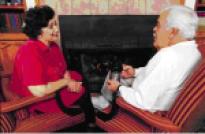 It’s the season of hope and new growth and opportunity. Flowers are blooming, trees are budding, the grass is growing. As with the season, seniors can find this hope, new growth and have new opportunities that they can remain in their home with security, independence, dignity and control. And like the many types of flowers, buds and new growth, the variety of how the reverse mortgage funds are used and numerous, basically endless. Here are some of the ways seniors have found hope and opportunity with their reverse mortgage.
It’s the season of hope and new growth and opportunity. Flowers are blooming, trees are budding, the grass is growing. As with the season, seniors can find this hope, new growth and have new opportunities that they can remain in their home with security, independence, dignity and control. And like the many types of flowers, buds and new growth, the variety of how the reverse mortgage funds are used and numerous, basically endless. Here are some of the ways seniors have found hope and opportunity with their reverse mortgage.
- Stay in one’s home where they may have raised their family, are familiar with the neighborhood and their neighbors and where they usually want to remain.
- Pay off a current mortgage to eliminate the monthly mortgage payments.
- Save one’s home when faced with foreclosure or tax forfeiture.
- Have improved cash flow with no monthly mortgage payments.
- Have funds for making home improvements or home modifications.
- Retire and not feeling like you have to work just to have money to pay the bills.
- Have cash flow to be able to pay taxes.
- Have funds to pay for home health care.
- Have funds for some assistance with home care or companion services.
- Have funds for adult day services.
- Have funds for medical expenses and prescriptions.

- Afford going to the dentist.
- Afford new eye glasses.
- Have funds for the needed hearing aid.
- Have funds to cover long term care expenses.
- Cover everyday living expenses.
- Not rely on credit cards.
- Not rely on children.
- Have funds for the little extras in life, like:
- getting one’s hair done,
- having cable TV,
- buying groceries,
- going to lunch with friends,
- treating their children to dinner,
- going to community plays or the theater or a concert,
- taking the grandchildren to the zoo or a movie,
- Depends (I had a client say with their reverse mortgage they could now afford to buy Depends),
- being able to do hobbies.
- Purchase a more dependable car
- Afford transportation if one can no longer drive.
- Afford the travel for the family wedding or reunion.
- Take the vacation they have dreamed of all their life.
- Protect some of their other retirement funds or investments where there might be taxes or penalties on withdrawals.
- Purchase a new home to downsize and/or move closer to family
- Have funds for emergencies.
- Reduce financial stress.
- Have funds to full fill needs and goals.
- To live with security, independence, dignity and control.
 It’s fulfilling to me to be able to help seniors find hope, growth, and opportunity with reverse mortgage (visit the links below for some stories). A reverse mortgage has given hope and opportunity to thousands of Minnesota seniors so they can remain in their home with security, independence, dignity and control even during trying times. If you know a senior who is looking for hope and opportunity, a reverse mortgage may be their answer.
It’s fulfilling to me to be able to help seniors find hope, growth, and opportunity with reverse mortgage (visit the links below for some stories). A reverse mortgage has given hope and opportunity to thousands of Minnesota seniors so they can remain in their home with security, independence, dignity and control even during trying times. If you know a senior who is looking for hope and opportunity, a reverse mortgage may be their answer.
To determine if a reverse mortgage is right for one’s situation, talk with an experienced licensed reverse mortgage expert to get the facts. Learn some of the facts at our website: www.RMSIDAC.com. “What to Consider When Talking With Reverse Mortgage Lenders” will help you determine questions to ask when choosing your originator.
© 2012 Beth Paterson, Beth’s Reverse Mortgage Blog, 651-762-9648
This material may be re-posted provided it is re-posted in its entirety without modifications and includes the contact information, copyright information and the following link: http://wp.me/p4EUZQ-y9
Related articles of stories on how seniors have used the reverse mortgage and how it’s made a difference in their lives:
- Reverse Mortgages Answers Prayers
- Finance Retirement With A Reverse Mortgage
- Know a Senior Who Wants Security, Independence Dignity ,And Control? A Reverse Mortgage May Be The Answer
- Reverse Mortgages Help Celebrate Independence
- Reverse Mortgages Help Finance Home Care
- Respect for Oneself Increases With A Reverse Mortgage
- Can’t Afford To Retire? A Reverse Mortgage May Be The Answer
- Reverse Mortgage Helps MN Senior To Be Prepared For The Future
- Reverse Mortgage Allowed Creation of Family Memories
- Reverse Mortgages Equal Independence For Seniors
- Reverse Mortgages Come To The Rescue for Senior Homeowners
Blog posts’ information is current as of date post published, program is subject to change in in the future. Contact us for current information, 651-762-9648.
This site or the information provided is not from, or approved by, HUD, FHA, or any US Government or Agency.













 Most seniors want to stay in their homes and remain independent yet often believe they can’t for a number of reasons. Making some home modifications could make their wish of remaining in their home a reality by providing a safer more comfortable environment.
Most seniors want to stay in their homes and remain independent yet often believe they can’t for a number of reasons. Making some home modifications could make their wish of remaining in their home a reality by providing a safer more comfortable environment.
